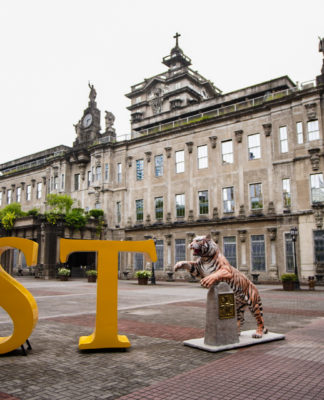FACULTY of Civil Law Dean Nilo Divina has called on students to raise their “concerns” directly to his office or to the student council, in response to anonymous posts on Facebook.
Divina released an open letter last Sept. 19 through the Civil Law Student Council’s official Facebook page, addressing students who had anonymously vented “their frustrations and disappointments with the [faculty], its professors, or fellow students” on pages such as “UST Law Files.”
“If you genuinely wish to help improve our faculty, as I presume you do, I encourage you to channel all your concerns either to me directly or through the student council. In return, I assure you that all your legitimate questions, problems, and requests will be appropriately addressed,” the letter read.
One of the anonymous posts claimed that some professors practiced “nepotism” and “favoritism” in class. “We have this subject last [semester] na hindi binalik ang final exam booklet. [Medyo] nagdududa kami na kaya [hindi] binalik ang booklet [ay] dahil may nangyaring ‘magic’ sa final grades. Lagi kami nagpa-follow up sa Dean’s office tungkol [sa] booklet namin, pero wala pa rin,” the post said.
“Gusto namin ng justice. Gusto sana namin fair magbigay ng grades. Wala sanang adjustment na gagawin dahil lang kamag-anak o dahil maganda ang estudyante,” it said.
Also on Facebook, an alumna, Pia Embuscado, expressed her disappointment over the surge of complaints from Civil Law students. “If you have any ‘legitimate grievances,’ Dean Divina is waiting for it. Stop doing it here [on Facebook]. We expect more from you considering that you [have] better facilities now than what we had before,” Embuscado said.
Civil Law Student Council President Victor Villanueva urged the students behind the controversial Facebook page to remove their cloak of anonymity.
But he said: “The fact that some students find the need to express their sentiments anonymously, not just in UST Law Files but in all Facebook pages of similar nature, reflects the inherent difficulty among students, not just law students, to challenge the authority in any school setting.”
Divina said bringing the complaints to his office was only fair to the people involved. “[I]t affords fairness to people who may be perceived to be the cause of the problem by giving them sufficient opportunity to explain themselves, a process so basic in law,” he said in his letter.
Divina emphasized that he was open to communication, and that students were not barred from bringing forward their sentiments.
“One thing good about our faculty, the dean’s office is always open. The dean doesn’t sit on a pedestal or ivory tower … I’m here. We can discuss your concerns,” he said in an interview, adding that he had a dialogue with some students shortly after he released his letter. Dayanara T. Cudal















